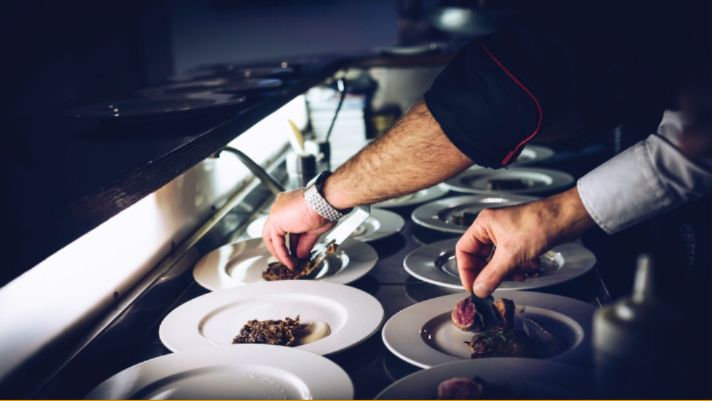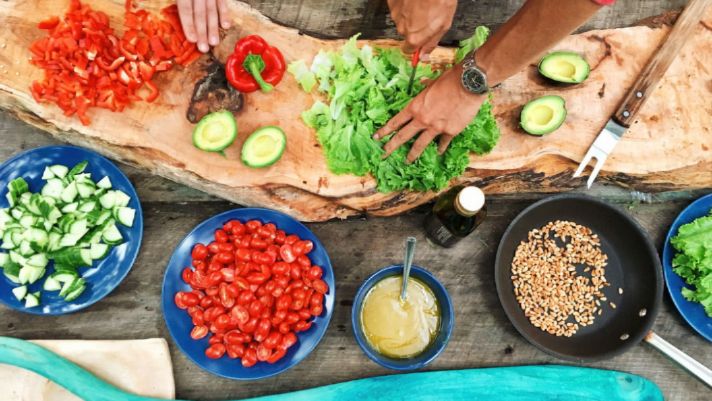It doesn't matter if you are a professional chef with years of experience in a restaurant kitchen or a new hobbyist preparing food in the comfort of your home, ensuring proper food safety is a crucial part of any meal. Proper food safety practices don't just end when it's time to clean up the dishes. And they don't begin when you plate a meal either. Follow these seven simple tips to ensure food safety from the early preparation stages and onward to delivery.
Take Care of Yourself Before Handling Food
We're all taught to wash our hands before eating, yet far too many people forget this simple practice. What's even worse is that those preparing meals for others may forget this vital step to maintaining a safe, clean kitchen. Sure, you won't want to miss the cleaning and sanitation processes that are required for your kitchen and dishware but don't forget that your own body must be cleaned before handling food.
If you're having trouble remembering to wash your hands before cooking, then it may be helpful to set a reminder on your phone. If you want a more traditional method, you can tie a string around your finger. Once the habit is in place, you'll find it much easier to maintain your momentum. Depending on the types of food you're making, you may want to wear gloves as well. Hairnets are popular among chefs and prep cooks for this reason. Overall, it is better to enroll in food handler training courses to get an overview of food safety issues, regulations, and techniques that will ensure you know how to maintain a safe environment. Courses like that also teach you the proper procedures for handling food so that you can reduce the risk of foodborne illness.
Clean Yourself After Meals, Too
Washing your hands isn't the only step you need to take to maintain a healthy relationship with your food. Paying attention to dental health should never take a back seat to other concerns that may seem more pressing. It's important for people of all ages to get regular dental checkups every six months. Routine visits to the dentist, painful as they may be for some, have incredible benefits on your dental health. When you visit on a set schedule, you give your dentist the chance to monitor your teeth and gums so they can notice and treat any potential problems. Make sure you’re taking care of yourself after you eat. There is no overestimating the importance of having strong dental hygiene.
Be Mindful of Transportation, Temperature, and Storage Methods
The global refrigerated market was valued at just over $5 billion in the year 2015. By 2022, it's expected to increase by another $2 billion. With so much money floating around in the industry, restaurants must see to it to keep their food safe at all times, especially during transportation and storage. Any customer-facing kitchen has even more cleanliness concerns to address in order to meet health and safety standards outlined by the Food and Drug Administration. Outdoor restaurants have even more guidelines due to the nature of serving food in an open-air environment.
While advances in food storage and transportation technology have made sanitation easier for restaurants, there will always be challenges to address. If you own or work in a restaurant that relies on transportation for its foods, then having access to reliable refrigeration is an absolute must. It's always worth the time to invest in the latest refrigeration units and trailers to ensure that food gets where it needs to be without going bad and going to waste.
Pay Close Attention to Different Kinds of Foods
Restaurants are a popular business model. These means they carry an even greater responsibility to be mindful of the way they handle and prepare their food. This doesn't just apply to the head chef, either. Each and every employee must be educated on proper food handling procedures. By the year 2027, the restaurant industry is predicted to create approximately 1.6 million jobs. Many of these jobs will sprout within diverse restaurants that serve a variety of sensitive foods. While this presents exciting opportunities for foodies and casual consumers alike, it also creates even more concerns for keeping foods safe.
For example, if you serve ethnic food, as 63% of chefs do, you have to make sure your foods uphold safety standards and your chefs have to understand how to safely prepare everything. Of course, there are more obvious examples of sensitive food items too, such as raw poultry. Be sure that you're always mindful of the kind of food you're preparing. Trying to apply one approach to every different dish can lead to potentially disastrous results.

Maintain Proper Safety Measures in the Kitchen at Home
Finally, you should recognize that food safety tips don't just apply to restaurants, diners, and cafeterias. You should always adhere to proper food safety guidelines in your kitchen at home, too. Because most people feel more comfortable in their own home kitchen, they are far more likely to neglect taking the proper precautions to ensure their food is safe for consumption. You can combat this tendency by establishing the right habits, and placing lists up on your refrigerator.
When it comes to prepping your kitchen for a meal, make sure you have adequate counter space. You'll also want to take some time to clean all surfaces where any food might be touching. Paying attention to your dishes and cooking utensils is key, too. If you have dishes that need to set, marinate, or preheat, that provides an excellent window of opportunity for preparing your workspace.
Once the meal is finished, don't let dirty dishes pile up. Unclean dishes and surfaces can produce harmful bacteria if they're left untouched. Even worse, once moisture is added, the rate of bacteria growth increases. Even though it may feel like the last thing you want to do after cooking and eating a meal, make sure you get your dishes and countertops clean of any food scraps and debris.
Cooking should not be a source of stress and worry. Yet far too many people find themselves in a state of panic when they hear about all the potential dangers of preparing food in an improper manner. When you follow these simple food safety tips, you can rest assured that each and every meal will be healthy and nourishing for everyone involved.

